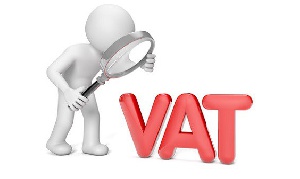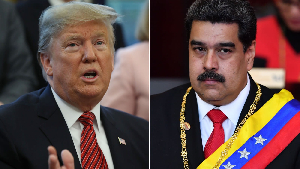The Ghana Revenue Authority (GRA) would, this year, start charging seven percent VAT Withholding Tax on individuals and entities that transact business with the Ministries, Departments and Agencies (MDAs).
“What we are seeking to do is that as a person is charging the 17.5 VAT on build-up cost of an item, the person is supposed to account to the GRA seven per cent VAT Withholding Tax, which is about 40 percent of the VAT,” The Reverend Oduro Yeboah, an Assistant Commissioner in charge of Statistics at the GRA, said.
Rev. Yeboah made this known at the closing ceremony of Chief Directors Policy Dialogue in Accra on Friday.
The dialogue was jointly organised by the United Nations Economic Commission for Africa and the Ministry of Foreign Affairs and Regional Integration.
It is intended to fashion out effective strategies and policies as well as build synergies to support the promotion of rapid inclusive economic growth of the country.
Making a presentation on the; Administration of International and Domestic Tax Revenue – The Perspective and Expectations of the GRA, Rev. Yeboah said the chief directors of the MDAs were supposed to withhold the amount when making payment for supply of goods and services to persons and contractors.
“As heads of the MDAs, you are supposed to withhold the taxes when payments are being made to individuals and entities that execute contracts and supply goods and services, and pay those revenues to the GRA within a month. Failure to do so would attract 125 percent interest on the amount,” he added.
Rev. Yeboah, however, stated that the MDAs that rented out residential facility were supposed to charge eight percent, non-residential (commercial) would attract 15 percent withholding tax, while accommodation facilities for chief directors and board members would attract a rate of 20 percent on gross amount.
Mr Yeboah said; “If it is supply of goods, three percent, supply works is five per cent, and supply of services is 7.5 per cent. For instance, for supply exceeding GHc2, 000 is three percent, supply works exceeding GHc2, 000 is five percent, and supply of services on gross amount is 7.5 percent”.
Rev. Yeboah said the Commissioner-General of the GRA would also appoint VAT Withholding Tax agents to charge the tax, adding that section 114 of the Income Tax Law, Act 896, mandated the MDAs to collect those taxes.
He said the GRA’s core mandate was to mobilise revenue through collection of taxes into the Consolidated Fund to support government’s development efforts.
The President’s vision of building “Ghana beyond Aid” would only become a reality if chief directors supported that agenda, in order to increase domestic revenue to meet the country’s developmental needs, he said.
“The revenue that the GRA collects is what the Government uses to pay civil servants, doctors, nurses, police and everybody, and enables the Government to provide infrastructure like roads, hospitals, schools and everything the nation needs,” he said.
Rev. Yeboah said the GRA had projected to collect GH¢39 billion this year, and urged the chief directors to collaborate with the Authority to meet its target.
He said the GRA would collaborate with the Ministry of Local Government and Rural Development to increase the mobilisation of property tax this year.
For the past 10 years, he said, the GRA had witnessed steady increment in its revenue collection trends and that in the year 2009, when the Authority was established, it collected GH¢4.63 billion, which increased to GH¢22.16 billion in 2015 and moved to GH¢33.14 billion in 2017.
Rev. Yeboah said the GRA was on course to registering all taxable persons in the country and entreated Ghanaians who were 16 years and above to apply for Tax Identification Numbers (TIN).
He warned that persons who failed to secure the TIN would not be able to transact business with government and would be refused tax clearance certificates.
He urged traders and individuals to fix tax stamps on commodities and products as required by law, saying; “GRA is poised to collect revenues that would help the country to be self-reliant and you are the people who can help us achieve that objective”.
Mr Emmanuel Kofi Nti, the Commissioner-General of the GRA, in a brief remark, urged the chief directors to buy into the President’s vision of building “Ghana beyond Aid,” and support the Government’s revenue collection drive to engender development.
Taxation is defined as a fiscal policy that every nation depends on to mobilise revenue for its national development.
It is a means by which various governments finance their expenditure by imposing charges on citizens and corporate entities.
Business News of Saturday, 17 March 2018
Source: ghananewsagency.org













